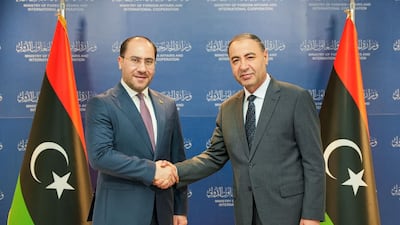A rising number of young Iraqi Kurds are embarking on perilous journeys to Europe from Libya, after crackdowns on other migration routes, Iraq's top diplomat in Tripoli has told The National.
“We are seeing a rise in the rates of illegal migration through Libya due to fragile security,” said Ahmad Al Sahaf, the Iraqi charge d'affaires, who was appointed in 2023.
“Human trafficking and smuggling networks adapt to countries’ measures and try to find alternative routes when border control measures increase in transit countries, and Libya is one of the most important of these routes.”
In recent years, Iraq’s Kurdistan region has quietly emerged as one of the main sources of illegal migration to Europe. Economic hardship, lack of jobs, political deadlock and fading trust in local authorities have left young people without hope and aspirations of a future in their home towns.
Smuggling networks operate openly in parts of the region, promising young people an easy journey and better life in Europe. Dozens have died while trying to cross the English Channel to Britain.
Mr Al Sahaf could not give a number for how many Iraqi migrants cross to Europe though Libya, or the cost of the trips, but said the Iraqi embassy helped 68 migrants to return to Iraq last year. A group of 41 others, including four minors, are ready to go back soon, he said.
Describing the route, he said the Iraqi migrants board planes in Turkey, Jordan and Egypt, landing first in Benina International Airport in Benghazi, eastern Libya, after security permits are arranged by the smuggling networks.
From there, they start a 1,200-kilometre road trip to the capital, Tripoli, on the Mediterranean coast, to take the boat from the coastal cities of Zawiya and Sabratha. The sea journey to Europe is a perilous one on which many hundreds have died.
“Some of them are occasionally arrested by the authorities, while others fall into the hands of informal armed groups,” said Mr Al Sahaf. The Iraqi embassy works on daily basis with the official migration centres to check on Iraqis, receive them and arrange their return, he added.

Libya has had little stability since a 2011 Nato-backed uprising ousted longtime dictator Muammar Qaddafi. The country split in 2014 between rival eastern and western factions, though an outbreak of major warfare paused with a truce in 2020.
While eastern Libya has been dominated for a decade by Field Marshal Khalifa Haftar and his Libyan National Army, control in Tripoli and western Libya has been splintered among numerous armed factions. Prime Minister Abdul Hamid Dbeibah leads the divided country's government of National Unity, which came to power through a UN-backed process in 2021.
Libya’s location on the southern rim of the central Mediterranean makes it the closest North African departure point for many migrants trying to reach Italy and Malta. Its long coastline, weak control over large areas across the country and multiple coastal departures make it an attractive hub for sea crossings.
As European states have tightened security on other routes − mainly via Turkey − Tunisia and Libya have emerged as departure points in recent years. EU member states, especially Italy, have funded, trained and equipped Libyan coastguard and supported authorities to intercept boats.
An unprecedented wave of migration from Iraq’s Kurdistan region has forced the UK to work beyond its borders to tackle the smugglers. Last year, Britain's then-home secretary Yvette Cooper and the Iraqi government signed an agreement that allowed UK security authorities to carry out raids in Iraq’s Kurdistan region.
“Libya is a country that is still in the process of recovery and re-establishing its full sovereignty, working to consolidate the stability of its legal and constitutional institutions,” Mr Al Sahaf added.
He said the country is experiencing “fluctuations in security”, creating an environment where human trafficking and smuggling networks thrive in Iraq, transit countries and inside Libya.
Iraq officially re-opened its embassy in Tripoli in December 2023 after being closed for 10 years due to the unstable situation. The country has an Iraqi community of about 2,200 people.
A joint committee between the two countries is set to convene soon with several agreements set to be signed, said Mr Al Sahaf.


